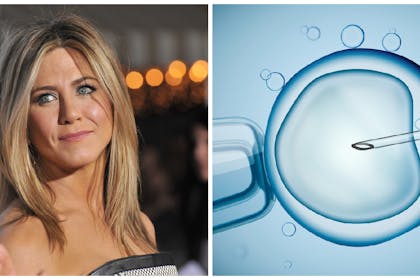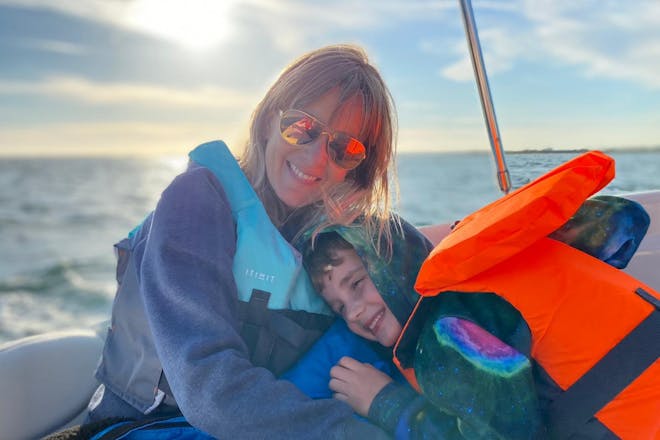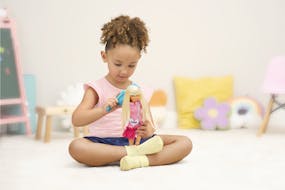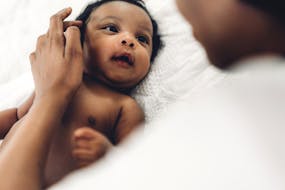Jennifer Aniston has spoken for the first time about trying to get pregnant. And her description of the ‘challenging road’ of IVF and fertility struggles is one many women can relate to. Me included.
Friends star Jennifer Aniston was forced to navigate her fertility treatment while headlines swirled with ‘is she, isn’t she’ pregnancy stories. This global scrutiny on your womb when you’re going through something so all-consuming and personal is unimaginable.
Jennifer told Allure magazine that what added to the pain was the ‘narrative that I was just selfish’, she says. ‘I just cared about my career. And God forbid a woman is successful and doesn’t have a child. And the reason my husband left me, why we broke up and ended our marriage was because I wouldn’t give him a kid. It was absolute lies. I don’t have anything to hide at this point.’
My story of IVF
On a far smaller scale, these narratives are played out for many of us, every day. I was 36 and in a meeting for work when an older woman I’d just met asked if I had children. When I replied no, she asked, ‘Oh, that’s a shame. Why have you decided not to have kids?’
FREE NEWBORN NAPPIES
I was stunned into silence. At that point, my husband Ian and I had been trying to get pregnant for nearly 5 years, I’d had a miscarriage and we were starting to talk about IVF. ‘Deciding’ not to have kids didn’t even come into it. We were trying our hardest to become parents and it’s all we wanted.
I remember mumbling some excuse about making a call before rushing out of the room and silently crying in the loos.
〝 Everyone tells you to ‘just relax and you’ll get pregnant’. Except for many of us, it doesn’t happen. 〞
This wasn't the only time assumptions were made that I was 'choosing' if and when to have kids. From well-meaning family members asking when we going to start a family to colleagues' eyes dropping to my stomach on the nights out when I wasn't drinking.
I'm sure many suspected we were having problems. When friends got pregnant, some looked awkward as they told me their happy news.
And I was happy for them, but it reminded me that we were still trying. And I didn't know if it would ever happen for us.
Trying to get pregnant
When you want to get pregnant – and can’t – it takes over your life.
In her interview with Allure , Jennifer says she spent her late 30s and 40s trying to get pregnant, adding:
‘It was a challenging road for me, the baby-making road.’
She adds:
‘I was going through IVF, drinking Chinese teas, you name it. I was throwing everything at it.’
I spent most of my 30s trying to become a mum, taking my temperature every morning and trying to chart my ovulation, cutting out booze (and ironically then being asked if I was pregnant. If only!).
Everyone tells you to ‘just relax and you’ll get pregnant’. Except for many of us, it doesn’t happen. Around 1 in 7 couples have difficulty conceiving .
It’s also a closely guarded secret that you carry around, a weight on your shoulders that you often feel you can’t share. I only told a handful of people what I was going through.
Now, there are incredible communities online (including our Netmums TTC forum ) that would have been hugely helpful in making me feel less isolated.
As the years rolled on, and I grew more desperate, I spent all my money on alternative treatments like reflexology, acupuncture and reiki. Anything that would mean result in getting pregnant.
The realities of IVF
Miraculously I did get pregnant, only to miscarry at 9 weeks.
When I went to see a fertility expert, he told me I had a low ovarian reserve and said he was amazed I’d even got pregnant in the first place.
I was lucky in that he found a reason I wasn’t getting pregnant. I was diagnosed with raised levels of natural killer cells, a type of white blood cell that fights infection. This basically meant my body would kill off any foreign cells that entered it – including an embryo.
The only option was IVF.
I’ve written before about my IVF journey (you can read it here ) and it’s a gruelling process. Scans, injections, examinations … it’s tough and it’s made harder to when you’re faced with the stark statistics.
How successful is IVF?
The NHS says the success rate for IVF for women under 35 is 32%. For women aged 35-37, it’s 25% and for women aged 40-42 it’s 11%. The NHS adds, ‘IVF isn't usually recommended for women over the age of 42 because the chances of a successful pregnancy are thought to be too low.’
I was incredibly fortunate (which feels like a total understatement) and got pregnant on my first cycle. My son Huxley is now 10 and I recently took him back to the IVF clinic to show him where his journey began. I am very aware I’m one of the lucky ones.
Not alone
I still feel emotional when I think about the years I spent trying to get pregnant. I can't imagine what it was like for Aniston, to face fertility struggles as one of the world's most talked-about celebrity must have been horrendous. It's no surprise she kept it a closely guarded secret.
For anyone going through fertility treatment right now, Jennifer’s interview will only help. By talking about IVF and infertility, you know you’re not alone.
The Friends actress adds:
‘I’ve spent so many years protecting my story about IVF. I’m so protective of these parts because I feel like there’s so little that I get to keep to myself. The [world] creates narratives that aren’t true, so I might as well tell the truth. I feel like I’m coming out of hibernation. I don’t have anything to hide.’
Support
If you want to talk to someone about your fertility struggles, you can contact the Fertility Network support line or talk to your GP for advice on next steps. The HFEA website gives impartial information about IVF, clinics and other fertility treatments.







